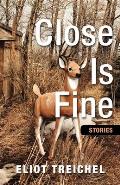
A hooligan is a hoodlum, a troublemaker. Someone a bit uncouth. But a hooligan is also a fish — the eulachon, a type of smelt endemic to the eastern Pacific Ocean. Eulachon are more commonly called candlefish, so named because of their high oil content, high enough that if you insert a wick into one, a dried eulachon will burn like a candle.
A hooligan is also someone who works at Ooligan Press, the nonprofit publisher of my short-story collection, Close Is Fine. Ooligan, you might have guessed, is yet another name for the eulachon. According to one theory, it is also the word that Oregon is derived from.
Ooligan Press describes itself this way:
A general trade publisher rooted in the rich literary tradition of the Pacific Northwest....From this wealth of culture, Ooligan Press aspires to discover works that reflect the values and attitudes that inspire so many to call the Northwest their home. Founded in 2001, Ooligan is a teaching press dedicated to the art and craft of publishing. Affiliated with Portland State University, the press is staffed by students pursuing master's degrees in an apprenticeship program under the guidance of a core faculty of publishing professionals.
At Ooligan, students put classroom lessons into real practice. The students are the press, and they rotate between various departments — acquisitions, editing, digital, sales, marketing — learning by doing, which is the only kind of educational practice that has ever made sense to me. The students at Ooligan share a deep love of books, a deep love for making things come alive. Students who've worked at the press have gone on to open their own literary agencies, their own editing and design companies, and their own small publishing houses. They've become freelancers, game writers, publicists, producers, and professors. They have, in nearly countless ways, enriched a wide community of readers and writers, especially here in Oregon and the Pacific Northwest.
When I sent my query to Ooligan, I'd already submitted Close Is Fine to dozens of agents and book contests and publishers. Some of the replies were the standard form rejections. Some were kinder, more personalized, and said things like, "We like this, but..." There was always a but. The main one, the one I heard the most, was some variation of "but nobody buys short-story collections."
My struggle was not unique. Most writers have faced something similar. I'm only sharing this to establish that when I mailed my query to Ooligan, I was as close as I'd come to crossing that line — that line where on the other side I'd surrender to the murmurings in my head, the ones telling me to accept that my book would never find a home and to just give up.
Several times during the long journey of writing Close Is Fine, my dad said something to me like, "You better hurry up and finish that book so you can afford to take care of us." I know he was mostly joking, that he was just trying to express a confidence that my book would succeed — that he was, in his own, awkward way, trying to broach a topic (my writing) that he didn't quite know how to broach. Each time, as has become my tendency over the years, I think I just smiled and chuckled and said something like, "Okay."
Usually what I was thinking was: I wish.
To be truthful, I had no idea how to broach the topic with him either — and still struggle to. To try to explain to him what I was attempting to write, or to try to explain the strange economies of literary journals or how short-story collections were notoriously hard to get published — how they rarely became bestsellers, not like the books of Nicholas Sparks, whose big-ass house and multiple cars my dad had recently seen featured on 60 Minutes — I could never muster the energy.
If I had tried to explain it, my dad probably would've responded with something like, "Then why don't you write something else?"
To which I probably would've only been able to answer: "I don't know."
That Close Is Fine eventually found publication with Ooligan has reaffirmed my belief that things often happen as they should, which is much different than things happening as we want. What I'm most happy about is that Close Is Fine has become a part of something larger than I ever anticipated — that it helped foster learning experiences, that it became more than product. This distinction thrills not only the writer me but also the community college instructor me.
 Since its inception, Ooligan has published over 25 books — books of fiction, nonfiction, poetry, YA. They've published Oregon Book Award winners and titles that have been included on the Oregon Cultural Heritage Commission's list of the 100 most significant books about Oregon. In 2009, Ooligan launched the OpenBook Series, an initiative focused on sustainable publishing. Next year they'll release Up Nights, a novel by Daniel Kine, as well as a yet-untitled memoir by Sean Davis, an Iraq War veteran and Purple Heart recipient — two books I'm looking forward to reading.
Since its inception, Ooligan has published over 25 books — books of fiction, nonfiction, poetry, YA. They've published Oregon Book Award winners and titles that have been included on the Oregon Cultural Heritage Commission's list of the 100 most significant books about Oregon. In 2009, Ooligan launched the OpenBook Series, an initiative focused on sustainable publishing. Next year they'll release Up Nights, a novel by Daniel Kine, as well as a yet-untitled memoir by Sean Davis, an Iraq War veteran and Purple Heart recipient — two books I'm looking forward to reading.
Eulachon are a relatively small fish, slender in size, not unlike Close Is Fine. Not unlike Ooligan. I'm a small-fish kind of guy. Actually, I am more of a beer and pizza kind of guy, but that is a different conversation. Perhaps I am wrong about this, but today's world seems strangely enamored with the big fish. In fact, it seems to keep creating bigger ones — corporations that merge and merge, that saturate, that monopolize. Meanwhile, budgets for programs like Ooligan shrink.
Eulachon will wander the ocean for three to five years before returning to freshwater to spawn. Although their habitat stretches from Northern California to Alaska, most originate in the Columbia River Valley. Once eulachon were so numerous they simply could be raked out of the water. Since the '90s, however, spawning runs have declined. Today, they are listed as threatened under the Endangered Species Act.
The eulachon's journey has never been an easy one. It never will be. Yet they keep coming back, swimming upstream, against the flow.